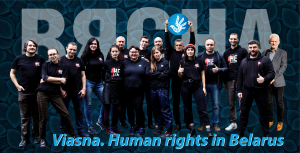On 7 September 2022 The Norwegian Nobel Committee decided to award the Nobel Peace Prize for 2022 to one individual and two organisations, who represent civil society in their home countries. They have for many years promoted the right to criticise power and protect the fundamental rights of citizens. They have made an outstanding effort to document war crimes, human right abuses and the abuse of power. Together they demonstrate the significance of civil society for peace and democracy.
This year’s Peace Prize is awarded to human rights advocate Ales Bialiatski from Belarus, the Russian human rights organisation Memorial and the Ukrainian human rights organisation Center for Civil Liberties. The first two are well-known and received many important human rights awards.
Ales Bialiatski was the winner of 11 other awards, see: https://www.trueheroesfilms.org/thedigest/laureates/72682FFF-628F-4A5D-B6B3-52A776FF0E47, while Memorial got 7 awards earlier [see: https://www.trueheroesfilms.org/thedigest/laureates/BD12D9CE-37AA-7A35-9A32-F37A0EA8C407], Oleksandra Matviichuk, the chair of the Ukrainian Center for Civil Liberties received a few days ago the Right livelihood award [see: https://www.trueheroesfilms.org/thedigest/laureates/75690f04-7a51-4591-8e18-0826b93959b3]
Ales Bialiatski founded the organisation Viasna (Spring) in 1996 in response to the controversial constitutional amendments that gave the president dictatorial powers and that triggered widespread demonstrations. In the years that followed, Viasna evolved into a broad-based human rights organisation that documented and protested against the authorities’ use of torture against political prisoners. Government authorities have repeatedly sought to silence Ales Bialiatski. He was imprisoned from 2011 to 2014. Following large-scale demonstrations against the regime in 2020, he was again arrested. He is still detained without trial. Despite tremendous personal hardship, Mr Bialiatski has not yielded an inch in his fight for human rights and democracy in Belarus. See also: https://humanrightsdefenders.blog/tag/viasna-human-rights-centre/
The human rights organisation Memorial was established in 1987 by human rights activists in the former Soviet Union who wanted to ensure that the victims of the communist regime’s oppression would never be forgotten. Nobel Peace Prize laureate Andrei Sakharov and human rights advocate Svetlana Gannushkina were among the founders. Memorial is based on the notion that confronting past crimes is essential in preventing new ones. After the collapse of the Soviet Union, Memorial grew to become the largest human rights organisation in Russia. In addition to establishing a centre of documentation on victims of the Stalinist era, Memorial compiled and systematised information on political oppression and human rights violations in Russia. Memorial became the most authoritative source of information on political prisoners in Russian detention facilities. The organisation has also been standing at the forefront of efforts to combat militarism and promote human rights and government based on rule of law. During the Chechen wars, Memorial gathered and verified information on abuses and war crimes perpetrated on the civilian population by Russian and pro-Russian forces. In 2009, the head of Memorial’s branch in Chechnya, Natalia Estemirova, was killed because of this work. [see also: https://humanrightsdefenders.blog/2019/07/15/ngos-remember-10th-anniversary-of-natalia-estemirovas-murder/]
Civil society actors in Russia have been subjected to threats, imprisonment, disappearance and murder for many years. As part of the government’s harassment of Memorial, the organisation was stamped early on as a “foreign agent”. In December 2021, the authorities decided that Memorial was to be forcibly liquidated and the documentation centre was to be closed permanently. The closures became effective in the following months, but the people behind Memorial refuse to be shut down. In a comment on the forced dissolution, chairman Yan Rachinsky stated, “Nobody plans to give up.” [see also: https://humanrightsdefenders.blog/2021/12/29/russias-supreme-court-orders-closure-emblematic-memorial/]
The Center for Civil Liberties was founded in Kyiv in 2007 for the purpose of advancing human rights and democracy in Ukraine. The center has taken a stand to strengthen Ukrainian civil society and pressure the authorities to make Ukraine a full-fledged democracy. To develop Ukraine into a state governed by rule of law, Center for Civil Liberties has actively advocated that Ukraine become affiliated with the International Criminal Court. After Russia’s invasion of Ukraine in February 2022, Center for Civil Liberties has engaged in efforts to identify and document Russian war crimes against the Ukrainian civilian population. In collaboration with international partners, the center is playing a pioneering role with a view to holding the guilty parties accountable for their crimes.
By awarding this Nobel Peace Prize for 2022 the Norwegian Nobel Committee is honouring outstanding champions of human rights and consistent efforts in favour of humanist values, anti-militarism and principles of law.
